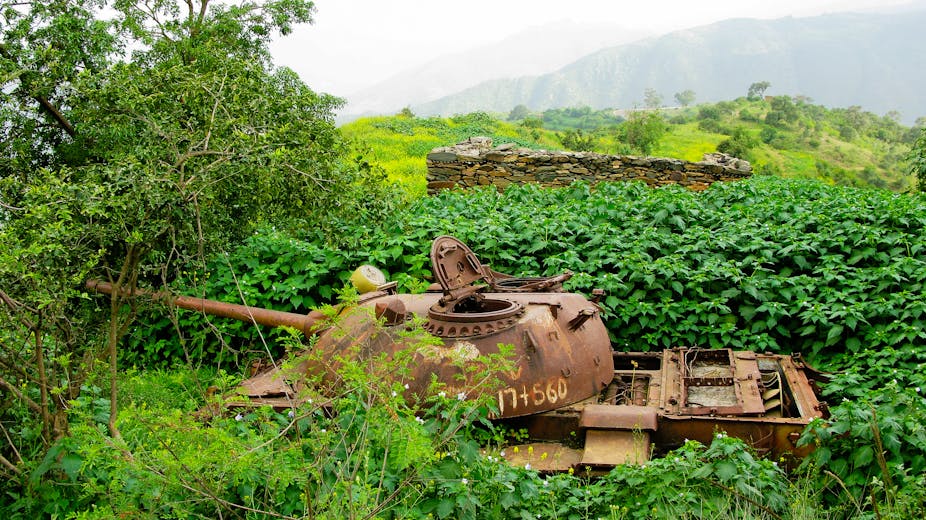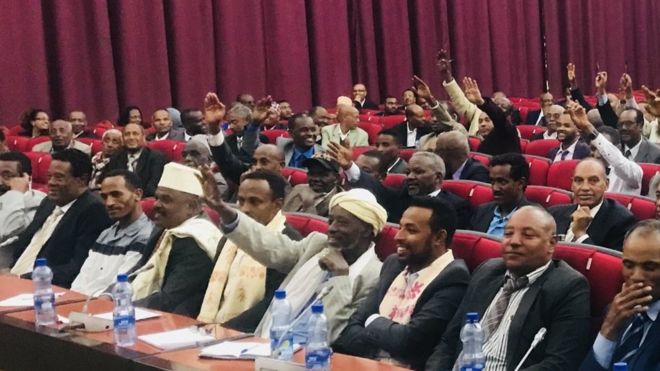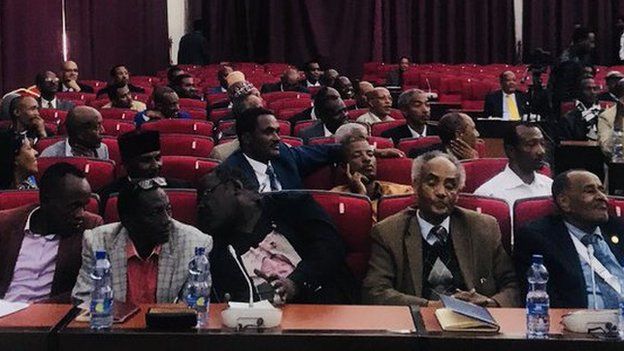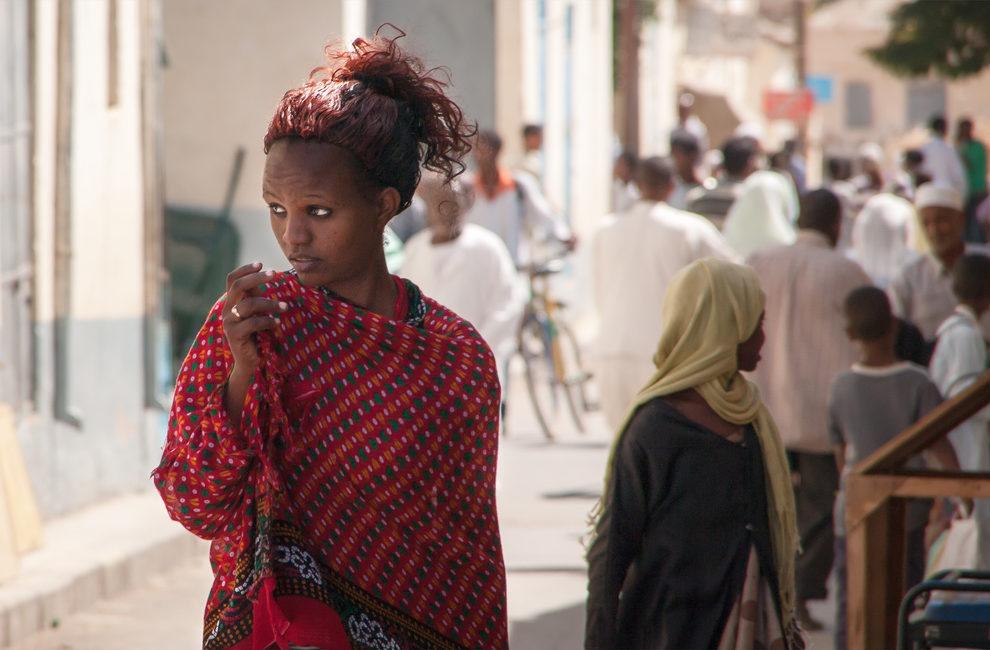Refugees have told IRIN that since the investigations began, they’ve been intimidated and harassed by some Sudanese staff at the UNHCR office in Khartoum, as well as by state security agents and officials of the Sudanese government’s Commission of Refugees. Refugees say they have been called on the phone or asked to meet with these officials and then been pressured not to testify on pain of having their cases for resettlement closed or losing access to other assistance. The Sudanese Commissioner of Refugees did not respond to multiple requests for comment.
On 15 May, IRIN published a reportbased on interviews with more than a dozen refugees and a former UNHCR staff member. They alleged that decisions on which refugees would be permanently resettled to a third country were often made on the basis of bribes rather than standard eligibility criteria. Two days later, UNHCRsuspended resettlementfrom Sudan and confirmed that in February and March it had launched investigations into alleged corruption, and would soon deploy an anti-fraud team.
In a statement announcing the suspension, UNHCR encouraged anyone with information to contact its Inspector General’s Office(IGO), an oversight body that investigates complaints of misconduct, “without delay”.
Over the past 10 weeks, an IGO investigator has contacted refugees and asked them to do phone or Skype interviews. In an email seen by IRIN, “potential witnesses” were told their interviews could be recorded and details could be disclosed on a “need to know” basis with both the subject of the investigation and those involved in taking disciplinary action. The email also stated that they would be asked to swear an oath to tell the truth and shouldn’t discuss the investigation with anyone without prior IGO approval.
But refugees told IRIN they didn’t believe the investigation process offered sufficient confidentiality, and expressed concern that the UN’s refugee agency could provide little help if they were retaliated against. They said they didn’t believe they could come forward safely because of ties between some UNHCR staff and the Sudanese state, and feared reprisals from corrupt Sudanese and UN officials who may be exposed by the investigation.
“Refugees are afraid to speak because those at UNHCR have connections with the [Sudanese] security and can do whatever,” one refugee said.
In an emailed response, UNHCR said it is concerned by refugees’ allegations to IRIN of harassment by local UNHCR Khartoum staff and Sudanese officials. “We take these allegations very seriously,” the email stated. UNHCR encouraged refugees and others to report such behaviour to the IGO.
The IGOreceives hundredsof complaints around misconduct every year, including allegations of fraud in the resettlement and refugee status determination processes. When the IGO launches an investigation, they interview witnesses, the people accused of wrongdoing, and may gather documentary and other forms of evidence, according to investigation guidelines published in 2012.
Protection and privacy
Resettlement is a complicated process taking anywhere from several days (in emergency cases) to several years.
“Refugees are afraid to speak because those at UNHCR have connections with the [Sudanese] security and can do whatever.”
As IRIN reported in May, refugees in Khartoum allege that middlemen and local UNHCR staff with close ties to the refugee community have been requesting bribes to speed up and corrupt the registration and resettlement process. The going rate to do that for unregistered asylum seekers in Khartoum was about $15,000, refugees said. Resettling a whole family boosted the price to $35,000-$40,000 – money usually raised by relatives abroad. Around 1.2 million refugees are now in Sudan, and more than 2,000 people were resettled from there in the year ending September 2017, according to UNHCR.
In Khartoum, many refugees and migrants live in a constant state of concern over security and safety, analysts and researchers report. “In Sudan, migrants are vulnerable to a litany of abuses,” Human Rights Watch Sudan researcher Jehanne Henry, now the associate director of the Africa division, wrote last year. “Many live in legal limbo; can be rounded up and arrested at any time and summarily tried for immigration violations; and can be jailed, fined, and deported without due process or transparency.”
They face endemic abuse and harassmentfrom the Sudanese police, who regularly arrest them to solicit bribes and are accused of physical violence and sexual assault. Just last week, a video emerged online allegedly showing an undercover police officer raping a refugee woman in a Khartoum street, provoking debate around the sexual abuse of refugees by police officers.
Amid this atmosphere, refugees are anxious and constantly worried about their own safety. This is compounded by their confusion over who is actually carrying out the UNHCR investigations. Several told IRIN that UNHCR officials in Sudan not affiliated with the IGO, as well as some international UNHCR staff, had asked them to visit the Khartoum office to be interviewed. This scenario worried the refugees, who said they would be at risk because the very people they are making allegations against would see them. They were also concerned that translators might feed details of their testimony to the accused personnel.
“I thought it was going to be confidential,” said one refugee, after taking part in an interview in the UNHCR compound in Khartoum. “I don’t like the idea of going to that office,” the refugee said, adding that those accused were not good people and had a “network of people in key areas”.
“There are many refugees who [have] witnessed the corruption but are afraid to [say] it,” the refugee said. “The consequences [of coming forward] will be life-threatening.”
Another refugee recounted an incident in the reception of the UNHCR office in May in which Sudanese staff involved in the resettlement process warned refugees not to share any information about their cases with a visiting international team who were asking about the corruption allegations. “The local staff spoke to the refugees in Arabic, saying ‘don’t tell them’,” the refugee explained, adding that the international staff who were present did not understand Arabic.
UNHCR spokesman Babar Baloch said last month that protection is provided for witnesses in certain cases. “Witness protection is a top priority, and where serious safety concerns arise UNHCR has mechanisms in place to respond,’’ he said. “However, as you will understand, for obvious reasons, we won’t be able to discuss details publicly.”
UNHCR did relocateseveral witnesses during a similar investigation surrounding Kenya’s Kakuma camp in 2001. And IRIN was told by a UNHCR official who is not based in Khartoum, and who requested anonymity, that some refugees whose testimony was deemed sensitive have been moved elsewhere for their safety during other investigations, including another one in Kakuma in 2016-2017.
Yet two refugees in Khartoum who are potential witnesses to the Khartoum investigations told IRIN their direct pleas to the IGO and UNHCR for protection, including to be moved to a safe place, had been declined or ignored. Both told IRIN they fear for their lives.
“What they should be doing is resettling them,” a current UNHCR resettlement officer, who has witnessed IGO investigations elsewhere in East Africa and requested anonymity, said. “It’s a perfect resettlement case.” Without emergency resettlement or the option of witnesses entering a safe house, the officer said: “No one talks. No one will tell them what’s happening. So it just keeps happening.”
Fear of the Sudanese state
UNHCR has previously highlighted the concerns it faces around protection during investigations. A March 2018 overview of the IGO’s workstated that “lessons learned from key investigations” included that “the support that UNHCR can provide to witnesses who face security risks when they are involved in investigations is limited” and “the primary responsibility for witness protection lies with the host State.”
“No one talks. No one will tell them what’s happening. So it just keeps happening.”
Several refugees who said they were afraid to take part in the Khartoum investigation said they knew they couldn’t turn to Sudanese officials if testifying led to problems. They referred to an incident in April 2017 when dozens of refugees protested at the UNHCR Khartoum compound to draw attention to their allegations of corruption in the resettlement process. Six refugees who were present told IRIN that UNHCR staff had called the police, who set upon the protesters, leaving one woman with a broken leg.
When asked about the incident, UNHCR Sudan spokesman Steven O’Brien initially denied the police were called. Later, when provided with a video that appeared to show police inside the UNHCR compound on the day of the protest, UNHCR spokesman Baloch clarified that police officers had been present but said there was “no evidence of force being used”.
It is unclear how many people have voluntarily come forward to participate in the Khartoum probe, and UNHCR does not comment on current investigations. However, some refugees told IRIN they have long been too afraid to report exploitation and would not participate if asked, particularly out of fear of losing the protections and services associated with refugee status.
“We have never dared to complain because the UNHCR refugee card is the only thing that protects us from Sudanese officials,” one Eritrean woman said. Several refugees told IRIN they feared reprisals could take the form of their files with UNHCR or the Sudanese Commission on Refugees being closed or “lost”, which would mean losing their right to legal protection and the services that go along with it.
The 2017 human rights reportfrom the US State Department notes that refugees and asylum seekers in Sudan are “vulnerable to arbitrary arrest and harassment” in urban areas for incorrect or missing identity cards and authorisation documents.
“We fear retribution and jail, because if we’re removed from the protection of the UNHCR, we have no protection from the Sudanese government,” the Eritrean refugee explained. “So, I would love to file a complaint but fear the consequences of doing so. I feel like nobody at the UNHCR really cares about what we go through.”
A process on hold
As the investigation continues, the impact of the suspended programme is unclear, beyond the fact that hundreds of resettlements have been delayed for at least several months. Around 170 refugees were resettled from Sudan each month in the year ending September 2017, according to UNHCR.
Speaking on condition of anonymity due to the sensitivity of the topic, several former UN staff in Khartoum and elsewhere said they were worried that the suspended programme might put refugees waiting for resettlement at risk.
“So, I would love to file a complaint but fear the consequences of doing so. I feel like nobody at the UNHCR really cares about what we go through.”
“Sometimes these investigations take months and months and months to get to the bottom [of],” the former Sudan head of another UN agency told IRIN. “If people in urgent need of resettlement are sitting around for months, [UNHCR is] certainly not supporting their protection.”
Since mid-May, as the investigation has gone on, refugees and former UNHCR staff in Sudan interviewed over the past two months by IRIN have gone from being hopeful about the prospect of change to worrying that the situation may get worse.
“Maybe, once the media is gone, they will keep doing it,” a former UNHCR Sudan staff member said, referring to the alleged corrupt practices. “The situation is complicated in Sudan.”
Source=https://eritreahub.org/refugees-in-sudan-intimidated-during-probe-into-unhcr-fraud









 A man walking past the ruins of a building in the port city of Massawa, Eritrea, July 22, 2018.
A man walking past the ruins of a building in the port city of Massawa, Eritrea, July 22, 2018.




























